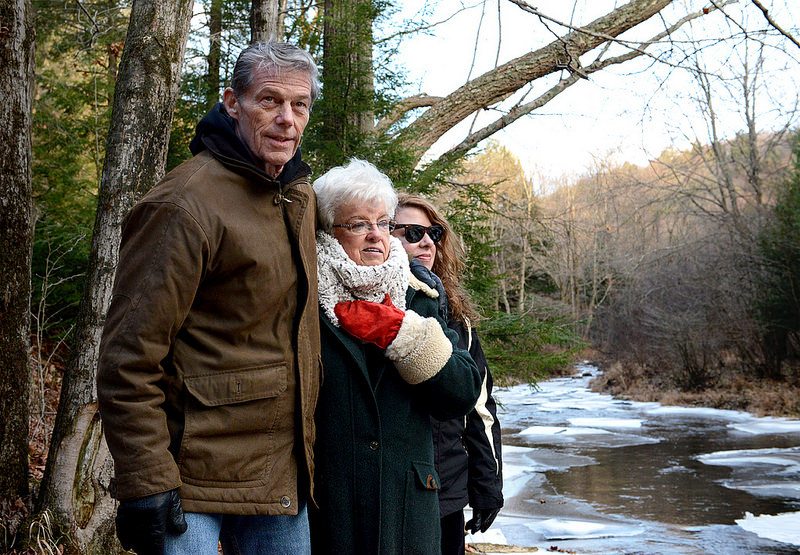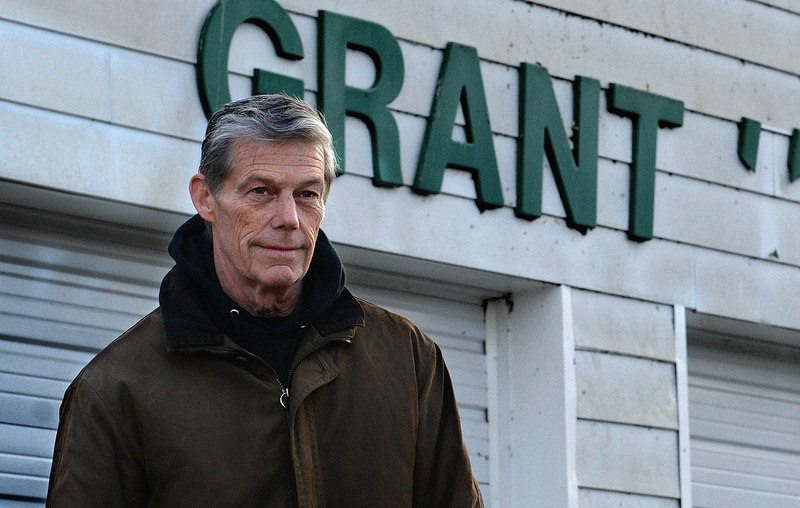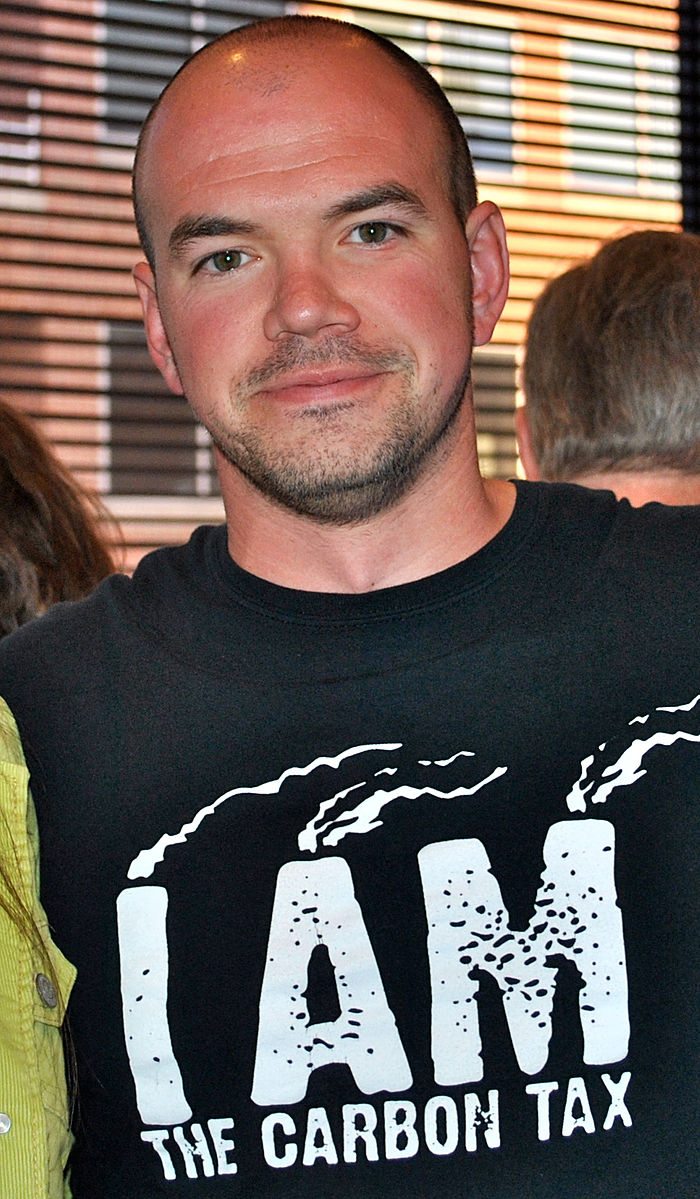A bold move by a community Public Herald has been following for years – Grant Township – just made historic news [again] by legalizing civil disobedience.
Last night [May 3], Grant Township in Indiana County, Pennsylvania made a bit of history. The municipality passed a local law legalizing civil disobedience. According to the new law, anyone who commits a nonviolent act of civil disobedience in order to protect the community’s rights under its Home Rule Charter has the legal right to do so – but not only that – the law also prohibits “any private or public actor from bringing criminal charges or filing any civil or other criminal action against those participating in nonviolent direct action.”

Grant Township Supervisor Jon Perry with residents Judy Wanchisn and her daughter, Stacy Long, at a fishing hole on Little Mahoning Creek. Supervisors and residents passed a local ban on fracking waste injection wells to protect the watershed and its residents. © Kyle Pattison for Public Herald
In November 2015, Grant became the first municipal community to establish a local Bill of Rights, which also happened to ban fracking wastewater injection. Before that, Grant Township made history in 2014 when it became the first place where an ecosystem filed to defend itself in a lawsuit.
Grant Township’s story is a rebellious one and plays a feature part in Public Herald’s upcoming documentary INVISIBLE HAND. Grant’s local, law-making strategy challenges the corporate status quo head-on, attempting to rewrite state and national law in order to let communities have first and final say in what goes down there.
As it stands, communities across the globe are grappling with how to protect themselves against industrial, corporate harm that is permitted by state and federal agencies, which essentially forces a certain amount of risk onto citizens of the community without its consent.
In the United States, we have freedom of speech and assembly, but anyone who civilly disobeys the government is subject to criminal and civil charges, like disorderly conduct or rioting that can include fines and jail time. Civil disobedience is a common tactic used throughout history when people decide that ‘enough is enough.’
“We’re tired of being told by corporations and our so-called environmental regulatory agencies that we can’t stop this injection well,” Grant Township Supervisor Stacy Long explained. “This isn’t a game. We’re being threatened by a corporation with a history of permit violations, and that corporation wants to dump toxic frack wastewater into our Township.”
A press release about Grant’s new law reveals backing from Tim DeChristopher, who spent nearly two years in prison for civil disobedience he carried out to block the auction of public lands in the redrock country [think Arches] of southern Utah to oil and gas companies for drilling/fracking/mining. DeChristopher posed as a bidder in the auction and won bids for 22,000 acres of public land that were later determined were never supposed to be auctioned in the first place.
DeChristopher was charged in 2009 with two felony violations of the Federal Onshore Oil and Gas Leasing Reform Act and for making false statements. Released in April 2013, he is now co-founder of the Climate Disobedience Center.
Regarding Grant Township, he stated:
“I’m encouraged to see an entire community and its elected officials asserting their rights to defend their community from the assaults of the fossil fuel industry, and I know there are plenty of folks in the climate movement ready to stand with Grant Township.”
– Tim DeChristopher, Co-founder, Climate Disobedience Center [photo: Wikimedia Commons]
In June 2014, the elected supervisors of Grant Township unanimously enacted a Community Bill of Rights Ordinance that banned the underground injection of toxic waste from oil and gas fracking. The township was then sued by Pennsylvania General Energy, a company that wants to inject waste underground there, a practice that is known to pose risk to nearby drinking water supplies. All of Grant Township’s residents are on private well water.
PGE asked the court “to force the Township to pay damages for violating the corporation’s civil rights” by banning wastewater injection, and “to force the Township to pay for the corporation’s legal fees.”
Though a judge struck down parts of the township’s Ordinance in favor of PGE, she based her decision on the fact that Grant was a “second class township” under state code and didn’t have the authority to stop waste injection. So the people of Grant Township set about and democratically elected to become a Home Rule Municipality instead. They then drafted and passed a Home Rule Charter with help from Community Environmental Legal Defense Fund (CELDF), which is also representing Grant Township pro bono in the ongoing litigation with PGE.
Grant’s Bill of Rights does a few things, including:
- Recognizes people’s rights to clean air and water
- Asserts the right to local community self-government
- Proclaims the right to be taxed fairly
Grant Township Supervisor and Chairman Jon Perry summed up the township’s ongoing, several year battle by saying, “Sides need to be picked. Should a polluting corporation have the right to inject toxic waste, or should a community have the right to protect itself?”
Perry continued, “I was elected to serve this community, and to protect the rights in our Charter voted in by the people I represent. If we have to physically and nonviolently stop the trucks from coming in because the courts fail us, we will do so. And we invite others to stand with us.”

Supervisor Jon Perry, one of three Grant Township supervisors defending the community’s right to self-govern. © Kyle Pattison for Public Herald






The people of Grant Township need to understand that they do have rights Federally to protect the waters of their Township. The Federal Natural Gas Act (NGA), 15 U.S.C. §§ 717–717z, establishes a “comprehensive scheme of federal regulation” but the premptive powers are limited by three statutory exceptions. Specifically, 15 U.S.C. § 717b(d) states that the Act does not “affect [] the rights of states under (1) the Coastal Zone Management Act of 1972 (16 U.S.C. § 1451 et seq.); (2) the Clean Air Act (42 U.S.C. § 7401 et seq.); or (3) the Federal Water Pollution Control Act (33 U.S.C. § 1251 et seq.).” See ( https://www.law.cornell.edu/uscode/text/33/1251 ) People are missing opportunities I fear because of a lack of understanding of their rights under the Federal Water Pollution Control Act.
The Federal laws are a scam written to protect the industry rahter than the people. Dick Cheney made sure gas was exempted from the Clean Water Act, for which he should be tried for crimes against humanity
While it is true that one-paragraph section of the 551-page Energy Policy Act of 2005 exempted hydraulic fracturing from the Underground Injection Control (UIC) provisions of the Safe Drinking Water Act (SDWA). The UIC portion regulates holes drilled to inject contaminants deep underground and wells used to force oil and gas to the surface.
It doesn’t cover the Clean Air Act, the Federal Water Pollution Control Act or any other environmental law even though the gas industry would like everyone to think that it does. It also doesn’t cover other aspects of oil and gas, such as drilling or production. And if an oil or gas company is found to be polluting drinking water, U.S. EPA can still use SDWA to penalize it. Citizens also have rights under the Federal Water Pollution Control Act but rarely understand this.
There is no doubt that the hydraulic fracturing exemption is unconstitutional and should have been deemed so years ago, but until that occurs the only effective recourse citizens have is to get themselves educated and demand other environmental laws that are already on the books are fully enforced in order to protect themselves and their Townships. This takes people power because I don’t think it will happen without it.
Which is why the resistance is growing everyqwhere thr gas industry is trying to expand. In RI there are 4 specific projects to fight,. and we are fighting them all. All the big time politicians want these projects, and give us the claim of JOBS, but the solar industry is creating way more jobs, and eveyone in the whole state knows it. The big one now is stopping the gas powerplant they want to build in Burrillville. Lotys of great organizing going on. And while e3veryone started out thinking it was a done deal, I have been convinced fromthe start that we can stop it. Recent hearing was 700 out of 800 people in opposition. Including all the neighbors.
ion RI the politicians are always tryingt o give us these mega projects for jobs. They are all scams. Every time they sneak one by before the public gets the scoop, it costs the state a bundle. And it is also clear that all the ones we stopped would have been disasters. But they still are not listening to us.
It’s really cute how you think we were too stupid to understand our “rights”. Here in gas, coal and oil country the government is in the back pocket of these companies. These same companies were using every loophole to attempt to dump their wastewater here. Why else would a Bill of Rights be a necessity? Instead of citing laws that were designed to protect the energy industry and giving your opinion, how about you travel to these small communities like Grant Township and attend their meetings, listen to the line of crap that the representatives from the companies give the citizens. We are not an uneducated bunch, hence why they aren’t able to dump their wastewater here. Our uneducated hillbilly behinds put up a fight out here in Pennsyltucky (a pretty intelligent one at that) and we won. Shut your pie hole, woman.
And outsiders need to understand that we were well aware of what the laws stated but we were also aware of how these companies were attempting to bypass said laws. You honestly think we didn’t bring up all of these laws that were being broken?
The potential for vapor intrusion problems can be difficult to assess. However, the possibility does exist that vapors from underground injection can travel through localized (and these are common in every formation) fractures to the surface. One of the investigations never finished by PA DEP was the Dunmore Gas Site. Carbon dioxide (and carbon monoxide and other contaminants) created hazardous conditions in homes.
While currently PA DEP believes there is no problem there logic is not supported by any data and conflicts with the former PADEP project managers, EPA staff, and contractor’s recommendations in several reports. Underground injection? Don’t allow this to happen. At Dunmore it seemed that potential finger pointing at the Keystone Landfill was not politically correct for the state agency.
http://thetimes-tribune.com/news/in-dunmore-an-environmental-mystery-never-solved-1.1870610
PADEP rebuttal countered by former Project Managers 18-page counter rebuttal.
http://thetimes-tribune.com/news/no-conclusion-reached-on-landfill-as-harmful-gases-source-1.1931134
Suggest discussion of this proposal with the USEPA Region III Underground Injection Control staff.
https://www.epa.gov/uic/underground-injection-control-epa-region-3-de-dc-md-pa-va-and-wv
Very interesting and likely worth keeping track of, which “media” will likely fail to do, one wonders why.
Drafting a law that makes civil disobedience legal, or as Chad Nicholson of CELDF puts it–a duty–raises many more issues than it resolves. It also exposes the motives of the Community Environmental Legal Defense Fund as more mercenary than moral. For an alternative, critically evaluative, perspective on the Grant Township law, please see: thewrenchphilosleftblogspot.com/2016/05/from-civil-disobedience-into-uncivil.html